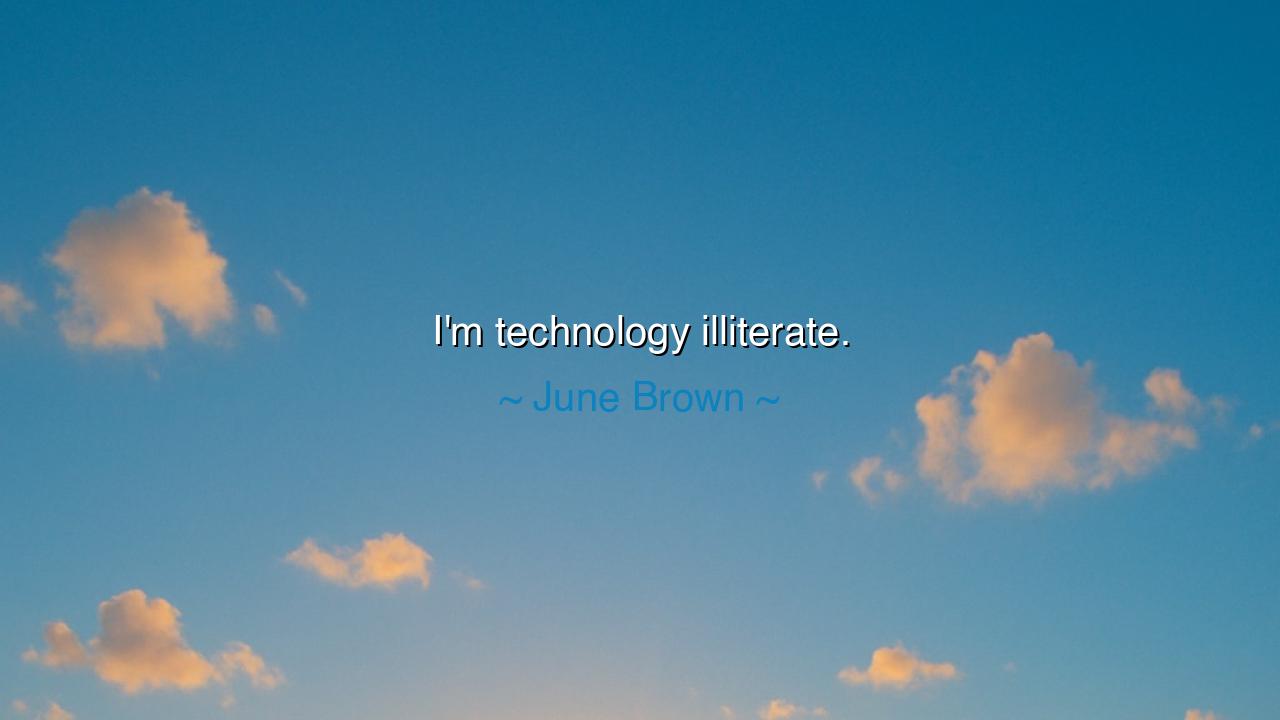
I'm technology illiterate.






June Brown, with disarming honesty, once declared: “I’m technology illiterate.” To the casual ear, these words may sound like a confession of weakness, yet within them lies a profound truth about the human condition. For to say “I am illiterate” is not to renounce wisdom; rather, it is to acknowledge the limits of one’s realm, and to remind us that no soul, however great, can master every field. Her words ring like the cry of the ancients, who taught that wisdom begins with humility—the courage to admit what we do not know.
In the age of bronze and iron, the old ones told their children: “He who claims to know all things has learned nothing; but he who admits his ignorance has already taken the first step toward wisdom.” To call oneself illiterate, even in jest or simplicity, is not the end of knowledge but the beginning. June Brown’s words speak to us across generations: though the world shifts and new tools rise—tools of technology, swift and powerful—the essence of human worth is not measured by mastery of every device, but by honesty, humility, and the willingness to learn.
Consider the philosopher Socrates, who stood before the people of Athens accused of corrupting the youth. When asked of his wisdom, he did not boast of knowledge. Instead, he said that he was wiser than other men only in this: that he knew he did not know. In that humility lay his greatness. Just as June Brown admitted to being “technology illiterate,” Socrates admitted to being ignorant of the many things men claimed to know. And yet, both point to the same truth—that acknowledging our limits is itself an act of wisdom.
There is also in her words a generational echo. Born in 1927, June Brown lived through a century of change, from the crackle of radios to the hum of digital screens. Her craft was in theatre and film, her art in voice and gesture, not in screens and circuits. For her, to be “technology illiterate” was to remind us that each generation is born fluent in its own tools but foreign to those of the future. Does this make them lesser? No, it shows the eternal truth: that every age requires patience and teaching, so that the wisdom of the past can walk hand in hand with the skills of the present.
History offers us many such examples. Consider the great Winston Churchill, who, though he commanded armies and empires, often struggled with the devices of his day. The telephone, the typewriter, even the mechanics of new engines bewildered him at times. Yet his genius lay not in mastering machines, but in wielding words and will to rally a nation. His so-called “illiteracy” in certain technologies did not diminish his greatness, for each soul has its appointed gifts. So too, June Brown’s legacy was not in her knowledge of circuits, but in the power of her art, which stirred millions.
From this, dear listener, a lesson shines clear: do not be ashamed of what you cannot yet do. To say “I am illiterate” is not to declare defeat, but to open the door to learning, or to acknowledge that your strength lies elsewhere. Do not measure yourself by the skills you lack, but by the courage you carry, the humility you hold, and the effort you are willing to make. Technology may rule the world, but humanity rules the heart.
Therefore, let this teaching guide your steps: when you encounter something unknown—be it a machine, a skill, or a task—speak with honesty, not pretense. Say, as June Brown said, “I am illiterate here.” Then, either learn with patience, or accept that your path may lie in other realms where your gifts shine brightest. In doing so, you honor both wisdom and humility.
And so, remember her words not as a confession of weakness, but as a beacon of truth. Illiteracy in one field does not make one poor in spirit. What matters most is the courage to admit, the willingness to grow, and the wisdom to know where your light truly shines.






AAdministratorAdministrator
Welcome, honored guests. Please leave a comment, we will respond soon